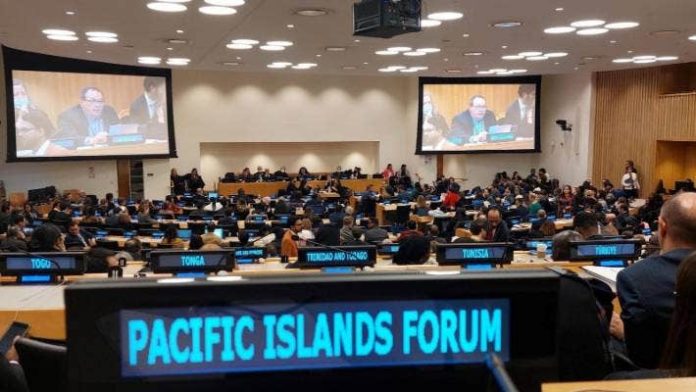The Pacific Islands Forum has applauded a United Nations treaty to protect ocean life by establishing protected areas in international waters.
The “ambitious” treaty was reached at the UN this week with some 193 countries agreeing to the legal framework.
Forum secretary-general Henry Puna said the global ocean treaty comes at a time of growing threats from climate change, overfishing, shipping traffic and seabed mining on the high seas.
“The ship has reached the shore,” conference chair Rena Lee, of Singapore, announced.
Puna, who is also the Pacific Ocean Commissioner and was in New York for the talks, said optimism was high throughout the discussions.
The former Cook Islands prime minister said that for years, disagreements over funding and fishing rights had caused delays in the negotiations.
The “high seas” lies outside a country’s jurisdiction – beginning at the border of a country’s exclusive economic zone (EEZ) and extending up to 370km from the coastlines.
“It makes up more than 60% of the world’s oceans by surface area and is home to millions of species and ecosystems.”
The UN said the Pacific Ocean spans over 40 million square miles but only a small part of that is protected through the UN Convention Law of the Sea (UNCLOS) to guide the conservation and use of the oceans.
“[UNCLOS] provides protection for the seas that are 200 miles beyond our last land but the waters beyond them are not protected,” the UN said in a statement.
“Biodiversity Beyond National Jurisdiction (BBNJ) is the treaty which will provide some protection as well as provide the guidelines for how should we deal with commerce, science and in commercial activities on the high seas. It is of crucial importance.”
Nearly 10 percent of marine species are at risk of extinction, while climate change affects 41% of these threatened species, a report by the International Union for Conversation of Nature (IUCN) revealed in December.
“Currently, 1.2 percent of these international waters, a vast reserve of undiscovered biodiversity, are protected,” the report said.
Greenpeace Aotearoa said Pacific nations occupied 20% of the world’s EEZ and had long advocated for an international, legally binding instrument to preserve marine life in areas beyond national jurisdiction.
Ocean campaigner Ellie Hooper called the treaty a “monumental win” for ocean protection and an important sign that multilateralism still worked in an increasingly divided world.
“The agreement keeps the 30×30 target – protecting 30 percent of the world’s oceans by 2030 – alive. It provides a pathway to creating fully or highly protected areas across the world’s oceans,” Hooper said from New York.
“There are still flaws in the text, and governments must ensure that the treaty is put into practice in an effective and equitable way for it to be considered a truly ambitious treaty. There’s work to be done.”
Hooper said the European Union, United States and China were key players in brokering the deal, showing “willingness to compromise”.
But so was a coalition of developing nations – known as the Group of 77 (G77), she said.
Conservationists said sharing marine genetic resources from plants and animals in the ocean would benefit society, including in the pharmaceuticals, food and industrial sectors.
Marine conservation scientist Daniel Dunn said the ocean was considered crucial in the fight against the climate crisis, as ocean temperatures continued to rise, threatening marine life.
He said there were no established legal processes for creating marine protected areas on the high seas.
The treaty “articulates a new regime for access and benefits sharing of marine genetic resources, which have already been used to develop extremely lucrative pharmaceuticals by corporations and countries who can afford to access these deep and distant areas”, Dunn, who teaches at the University of Queensland, said in a statement.
“Ocean ecosystems create half the oxygen humans breathe and limit global warming by absorbing much of the carbon dioxide.”
Puna said during the Forum’s special retreat in Fiji last month, leaders had called on the international community to “act now and save the ocean”.
Pacific ambassadors to the UN – Samoa’s Dr Pa’olelei Luteru, Papua New Guinea’s Max Rai, Ilana Seid of Palau, Jane Waetara from the Solomon Islands, Fiji’s Satyendra Prasad, Nauru’s Tilson Ephraim and Cook Islands’ Sandrina Thoondoo and Teuru Tiraa-Passfield – met with Puna and assured him of their governments’ support for the BBNJ negotiations.
“The legally binding BBNJ pact represents the first common framework agreement on ocean protection since the adoption of the 1982 UNCLOS, which established the high seas as an area where all nations can conduct fishing, shipping and research,” Puna said.
The treaty text will now go through technical editing and translation, before officially being adopted at another UN session.
SOURCE: STUFF NZ/PACNEWS














